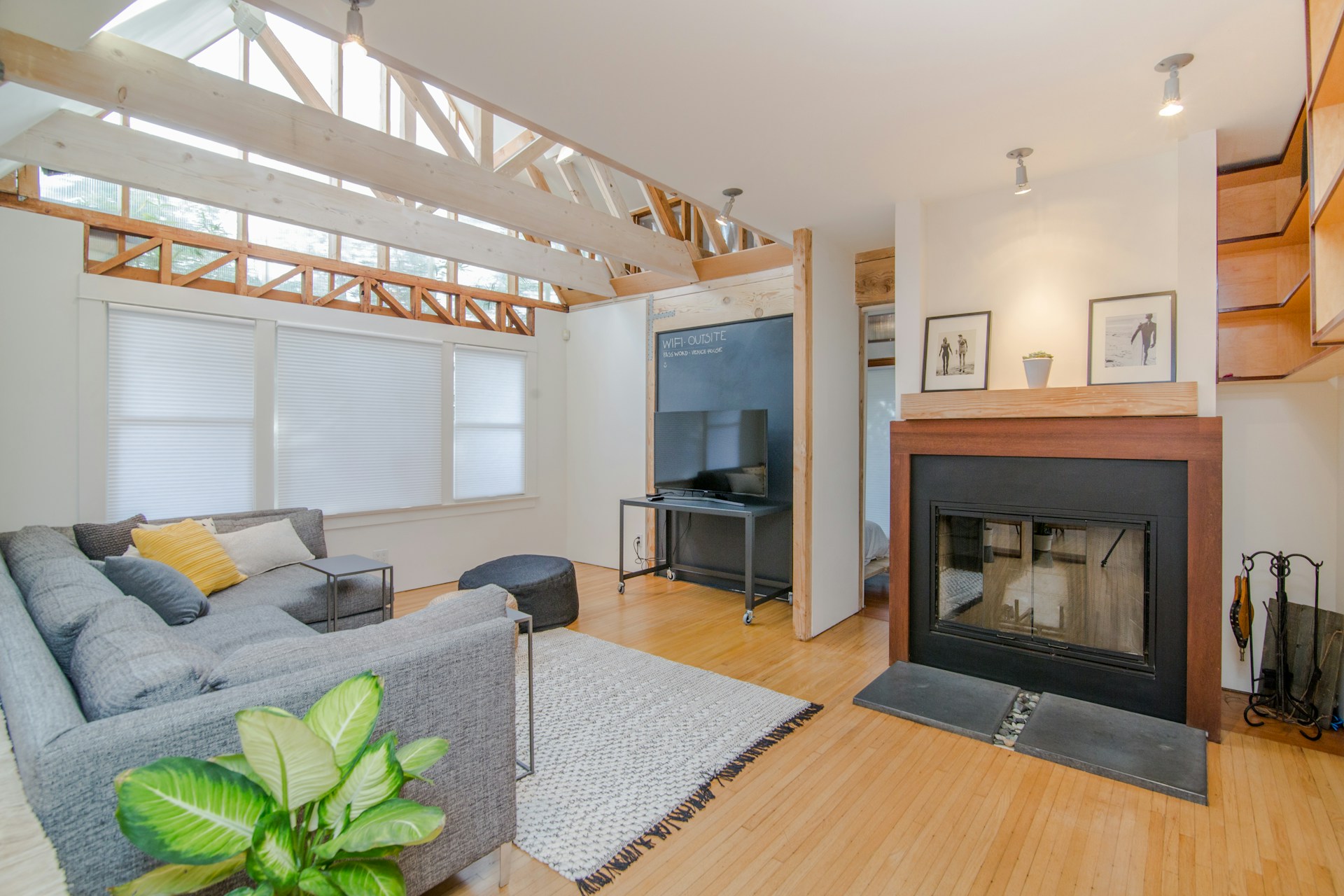Vietnam for digital nomads: A complete guide
Take advantage of this country's low costs and discover where to live, connect, and work remotely as a digital nomad in Vietnam.
Thinking about planning your trip and living as a digital nomad in Vietnam? You’re probably already picturing yourself photographing Sapa’s rice fields, watching the sunset in Ha Long Bay, or admiring Hoi An’s colourful lanterns.
But stop for a moment! Do you have your visa ready? Do you know how to handle taxes and what budget you need to live and work in Vietnam? There are many details to think about before buying that plane ticket.
At Holafly, we want you to have the best travel experience. That’s why we’ve created this guide with essential tips for your adventure in Vietnam. Join us!
Why choose Vietnam as a destination for digital nomads?
1. Affordable cost of living:
Vietnam has a lower cost of living than other Asian destinations such as the Philippines, Indonesia, Malaysia and Thailand. Food in Vietnam costs 36% less than in Thailand. You can rent apartments from $250 per month or luxury options up to $1,000 in major cities like Ho Chi Minh or Hanoi.
2. Internet quality in Vietnam
Internet in Vietnam is fast and reliable, with average speeds of 80 Mbps. There are numerous coworking spaces, such as Hub Hoi An in Hoi An, which offer a comfortable atmosphere, good coffee, and networking opportunities.
If you want to stay autonomous and avoid the risk of unreliable internet in unfamiliar places, protecting your cybersecurity, we recommend the Holafly eSIM for Vietnam. With unlimited data, you can always stay connected safely and securely.
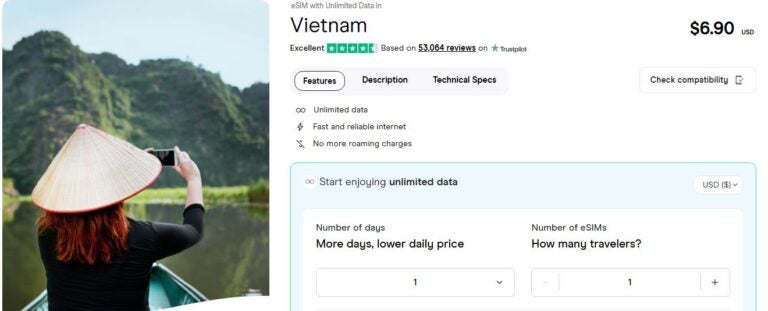
3. Cultural and natural diversity
Vietnam offers breathtaking natural beauty, from Sapa’s mountains and Da Nang’s beaches to the Mekong Delta’s floating markets. Hanoi and Ho Chi Minh blend modernity with rich history. Without a doubt, with these fixed places to visit, there’s no way to get bored in Vietnam.

Visas allowing residence as a digital nomad in Vietnam
One aspect you can’t miss out on is the digital nomad visa in Vietnam to be able to reside legally and peacefully in the country.
Currently, the e-Visa is the most convenient option for digital nomads since Vietnam doesn’t offer a specific visa for remote workers. Another alternative to this could be a business visa if you’re working with a company in this country.
| e-Visa | Business Visa |
| Available to citizens of more than 80 countries. It’s valid for up to 90 days and allows for multiple entries. | Aimed at professionals working with local companies. This can be done with a letter of invitation. |
Visa renewals and extensions in Vietnam: Visas in Vietnam are usually renewable. You can extend your stay by briefly leaving the country or switching to a different visa category, such as temporary residency.
Where to live and work as a digital nomad in Vietnam?
Vietnam, besides being a tourist paradise, can be your next temporary home with its growing accommodation options, co-working, public spaces, and infrastructure tailored for remote work.
Here are some key facts and recommendations about this place, full of history and cultural uniqueness that you’ll want to explore soon.
Ho Chi Minh City
Ho Chi Minh is Vietnam’s economic and tech hub, ideal for digital nomads with its many co-working spaces and growing expat community. The city is known for its bustling urban life, with streets full of motorbikes and a modern infrastructure that facilitates connectivity.
Ho Chi Minh’s food scene is a highlight, offering must-try local dishes like pho and banh mi. Ben Thanh Market is one of the most emblematic spots to immerse yourself in the local culture in contrast to the cosmopolitan atmosphere of the city.
Hanoi
Vietnam’s capital offers a unique contrast between tradition and modernity. In its Old Town, you can stroll through historic streets, while areas like Tay Ho offer a relaxed, multicultural vibe. Hanoi is also famous for its art cafés, popular with expats, providing quiet spaces perfect for telecommuting. If you’re a coffee lover, don’t miss the traditional egg coffee, a local specialty that will surely become a favourite.
Da Nang
If you’re looking for clean beaches, a relaxed lifestyle, and good connections to explore other parts of Vietnam, Da Nang is the place. The town has easy access to both the coast and the mountains. The city has many quiet spaces for relaxation and work and a welcoming and friendly expatriate community. Additionally, Da Nang is home to the famous Golden Bridge, a stunning bridge held up by giant stone hands—a perfect postcard to send to loved ones!
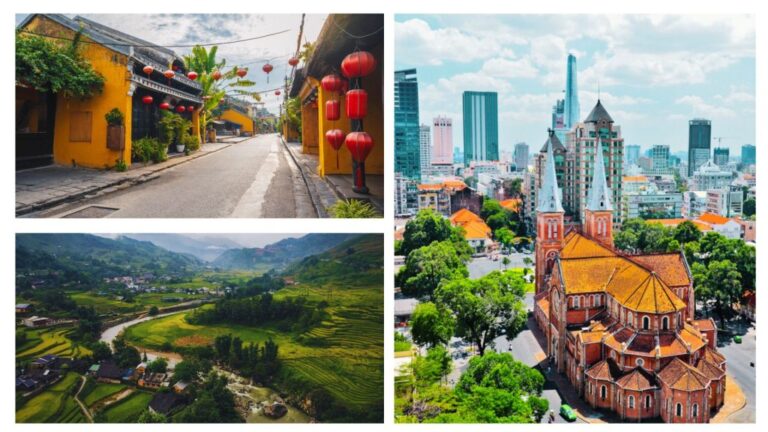
Hoi An
Hoi An is the perfect city for those seeking a more leisurely lifestyle and a connection with nature and the sea. Its Old Town, recognized as a UNESCO World Heritage site, is full of charm and colour, especially at night when lanterns light up the streets, creating a splendid atmosphere. For digital nomads who enjoy working in peaceful environments, Hoi An offers cozy cafés for a relaxed experience and moments of rest by the sea.
Da Lat
Known as the “City of Love” for its cool mountain climate and peaceful atmosphere, Da Lat offers a break from busy cities. Its French colonial architecture and night markets filled with local delicacies add to its charm. If you want to escape the heat of coastal cities and work in a more relaxed environment surrounded by nature, Da Lat is a great choice to balance work and enjoyment in a scenic setting.
Accommodation options in Vietnam
1. Co-livings and residences for digital nomads
We recommend the most popular spaces in Vietnam, designed specifically for remote workers, with common areas, fast internet and networking activities.
Hub Hoi An
- Location: Near the historic centre of Hoi An.
- Facilities: Accommodation overlooking the rice paddies, outdoor areas, quiet zones, community events (karaoke, ice baths), café with healthy options.
- Estimated price: From $350 per month for accommodation and co-working access.
Enosta Space
- Location: Da Nang, within walking distance to the beach and local restaurants.
- Facilities: Spacious rooms, common kitchen, on-site co-working with fast internet, air conditioning, and in-house coffee.
- Estimated price: From $200 per month for accommodation and co-working access.
2. Shared flats and houses
If you prefer more independence as a digital nomad in Vietnam, prices vary by city, but generally, you can rent a basic apartment for around $300-500 per month.
Vietnam also has a growing supply of home exchanges through platforms such as HomeExchange. These platforms allow digital nomads to live in local homes in exchange for offering their own, an affordable and enriching option to experience local life.
3. Hotels and guest houses
Many nomads opt for more luxurious stays like boutique hotels or affordable guest houses, which usually offer basic services and good internet connection.
The Myst Dong Khoi
- Four-star hotel, located in Ho Chi Minh City.
- Price: From $120 per night.
- Amenities: Modern rooms with river views, rooftop pool, spa and gourmet restaurant.
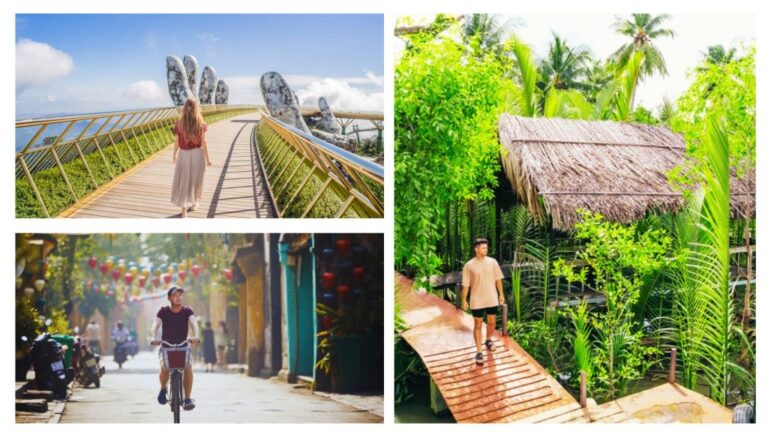
Co-working spaces in Vietnam
We’ve shown you that there are co-living spaces where you can live and work— the ultimate nomadic experience in one place! But if you prefer to work from a more private place or one that better suits your needs, here are other co-working options in Vietnam that might work for you:
Dreamplex
- A modern multi-location space in Ho Chi Minh City
- Price: From $100 per month.
- Services: Large collaborative spaces, networking events, and breakout areas.
Workyos
- Location: Ho Chi Minh City District 10, with easy access to public transport.
- Prices: From $6 per day or $100 per month.
- Facilities: Fast internet, air conditioning, in-house coffee, and professional atmosphere.
Public spaces, ideal to work in Vietnam
Vietnam has a wide variety of cafés with fast internet, relaxed atmospheres and inspiring views. Some popular options include:
| Cafeterias | Public libraries and parks | Beaches in Da Nang and Hoi An |
| Places like The Workshop in Ho Chi Minh City or Hoi An Roastery in Hoi An are popular for their excellent coffee and free Wi-fi. | The Ho Chi Minh General Library and the riverside parks in Da Nang offer quiet surroundings and internet access. | It’s common to find digital nomads working from seaside areas with good internet connections and cozy spaces. |
Make your trip a seamless experience! With Holafly, keep high speed internet in Vietnam without the need to change your SIM. Activate your plan and surf without limits with your eSIM for Vietnam!
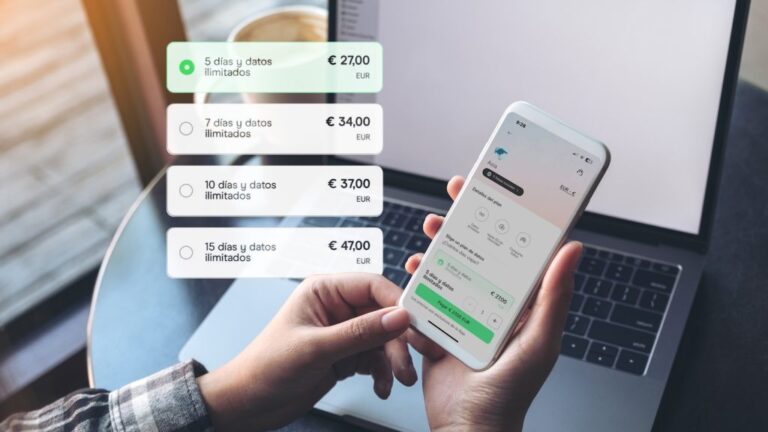
Taxes for digital nomads in Vietnam
Vietnam doesn’t have a specific tax regime for digital nomads, so your tax obligations depend on factors like stay duration and tax residency.
Do I have to pay local taxes as a digital nomad?
| Tax residents | Non-residents |
| If you spend more than 183 days in Vietnam in a calendar year or have permanent ties (like housing), you are considered a tax resident. In this case, you must pay tax on your overall income at progressive rates of up to 35%. | If you don’t meet the tax residency criteria, you’ll only be taxed on income earned in Vietnam at a fixed rate of 20%. |
Double taxation treaties
Vietnam has signed double taxation treaties with more than 80 countries, including Spain, Mexico, the USA and several European countries. These agreements prevent you from paying tax on the same income both in Vietnam and in your home country. To benefit from these agreements, you must present documents such as a tax residency certificate issued by your country.
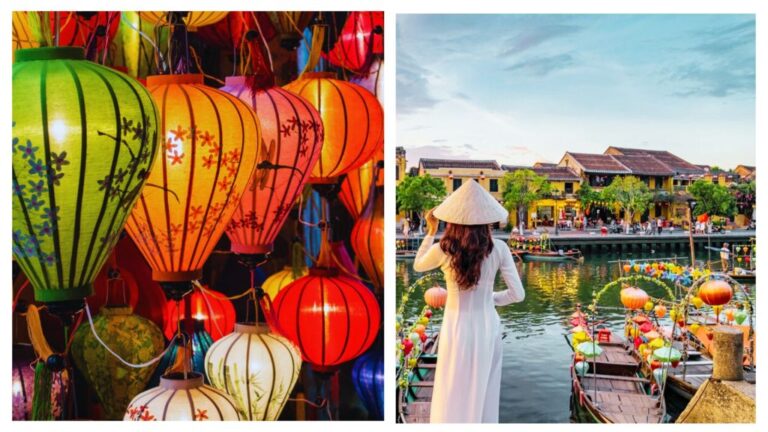
Health insurance and health service quality in Vietnam
Vietnam offers a mixed health care system, with both public and private options. Public hospitals are affordable but limited in infrastructure and resources, leading to long waits and basic services.
On the other hand, private hospitals like Family Medical Practice and the French-Vietnamese Hospital offer higher quality care, qualified doctors, and more modern services, but at higher costs.
Health insurance for digital nomads in Vietnam
As private medical services in Vietnam can be expensive, taking out health insurance for digital insurance for digital nomads in Asia is essential. Recommended options include Cigna, Axa, and IMG Global, which offer plans with extensive international coverage and expatriate-specific services.
The annual costs of these policies can range from $1,100 to $5,000, depending on the coverage selected.
Basic expenses of a digital nomad in Vietnam
Transport and mobility
Getting around Vietnam is easy thanks to its diverse transport system. In cities such as Hanoi and Ho Chi Minh City, buses can cost about $0.30 each way, as well as long-distance trains and taxis with starting fares of $0.50. You can also use applications such as Grab for affordable private transport.
To drive, you need to validate your licence in Vietnam. If you plan to ride a motorcycle, the most common vehicle, you must obtain a local license and have specific insurance to avoid fines and legal issues.
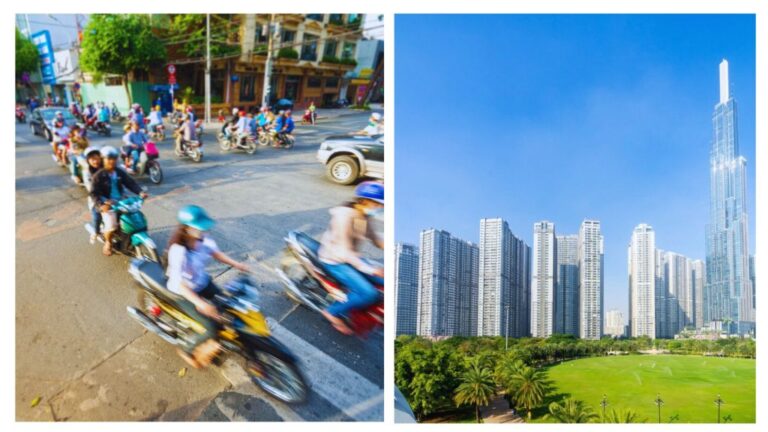
Managing finances of a digital nomad in Vietnam
Vietnam has an extensive network of ATMs, although fees for international withdrawals can range from two to six dollars.
Banks such as Vietcombank and Sacombank are recommended for foreigners, while apps such as Revolut o Wise are useful to avoid additional costs for international transfers and currency conversions.
Food costs in Vietnam
Vietnam is famous for its exotic and delicious cuisine. Eating in street markets costs between $1 and $2 per plate, while mid-range restaurants cost around $5 to $10 per meal.
Supermarkets such as Lotte Mart and VinMart are popular places to buy groceries, although imported products tend to be more expensive. An average budget can range from $150 to $300 per person.
Entertainment for digital nomad visa in Vietnam
Vietnam offers many options to enjoy your free time. We recommend some plans that you may find attractive:
1. Beaches and water sports
- Da Nang and Nha Trang are popular destinations for sun, sand and water sports such as paddle boarding and surfing. Visualise working with a view of the ocean – sounds good, doesn’t it?
2. Cultural and historical richness
- In Hanoi, the Temple of Literature and the Old Town are perfect for learning about Vietnamese history and culture between work sessions.
- Hoi An, with its colonial architecture and lantern-lit night market, is a peaceful place to unwind.
3. Unique nature and landscapes
- Sapa’ s rice fields are an escape to nature with breathtaking views worth photographing.
- Halong Bay, with its karst formations, is an iconic place where you can enjoy cruises or activities such as kayaking.

4. Urban life
- In cities like Ho Chi Minh, you’ll find a mix of modern spaces, active nightlife, and themed cafés, some open 24/7, perfect for socializing or working outside home.
5. Festivals and cultural events:
- Tet (Lunar New Year) and Lantern Festival in Hoi An are unique events to get to know the essence of Vietnam while enjoying the festive atmosphere.
Important: If you are a frequent traveler and want to stay connected without worrying about expensive roaming or looking for a new SIM at every destination, Holafly’s subscription plans are for you. With a single eSIM, enjoy internet in more than 160 countries for a fixed price and no surprises on your bill. travel without limits and connect easily and securely! 🚀🌍

Best seasons to stay in Vietnam
The climate in Vietnam varies from region to region. The north experiences cool winters from November to March and hot summers, while the south enjoys warm weather year-round with a rainy season from May to October. The best time to visit depends on your activities: For exploring mountains, autumn is ideal; for beaches, spring.
What to pack in your suitcase as a digital nomad to Vietnam? Avoid overpacking, as in Vietnam, you can buy inexpensive clothes at local markets or shops. Wear versatile and comfortable clothing that is light and breathable. For cooler winters, a jacket or sweatshirt will come in handy.
Cost of living as a digital nomad in Vietnam
We’ve gathered all the mentioned data to show you the general cost of living as a digital nomad in Vietnam. These figures vary depending on each traveler’s lifestyle, but here’s a reference based on key aspects to help you assess how appealing long-term living in Vietnam can be:
| Category | Average monthly cost | Details |
| Accommodation | $250 – 1,000 | Modest flats from $250. Co-livings from $200. Boutique hotels from $120 per night. |
| Food | $150 – 300 | Street food costs between $1 and $2 per plate, while mid-range restaurants cost around $5 to $10 per meal. |
| Co-working spaces | $100 – 200 | Spaces like Dreamplex and Workyos offer monthly memberships with fast internet and good coffee. |
| Transport | $30 – 60 | Public transport (buses $0.30/trip), apps such as Grab, and motorbike rental for $40. |
| Leisure and entertainment | $50 – 150 | Includes tickets to festivals, cultural activities, water sports and local tours. |
| Total expenditure | $600 – 1,600 | According to lifestyle (modest or more luxurious). |





 Language
Language 


















 No results found
No results found






